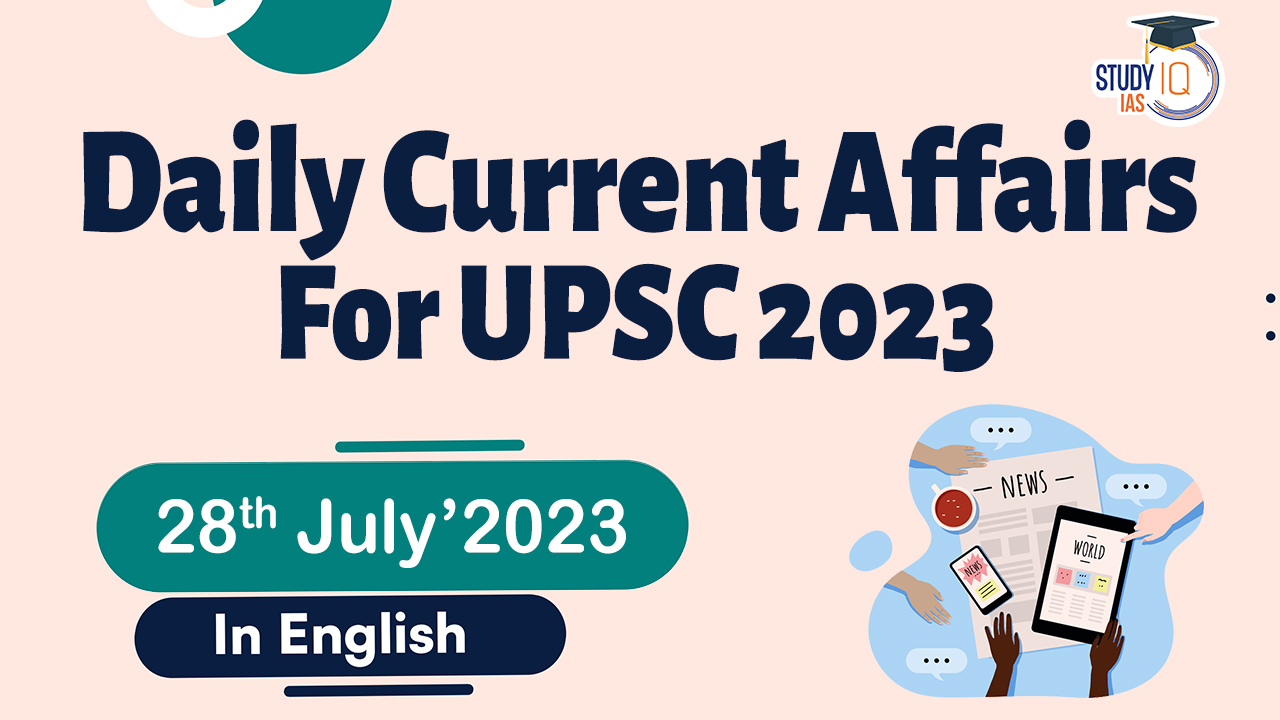Daily Current Affairs for UPSC 2023
Q) Which of the following is not correct about Circular Economy?
- It aims to minimize waste and maximize resource efficiency.
- It is designed to move away from the traditional linear economy.
- The products and resources are kept in use for as long as possible.
- The value of products get reduced because of multiple recycling.
Daily Current Affairs for UPSC – 27 July April 2023
Explanation:
Recently, the Union Minister of Environment, Forest, and Climate Change launched the Resource Efficiency Circular Economy Industry Coalition (RECEIC) on the sidelines of the 4th G20 Environment and Climate Sustainability Working Group (ECSWG) meeting held in Chennai.
- Option (4) is the correct answer: The circular economy is an economic model that aims to minimize waste, maximize resource efficiency, and promote sustainability. It is designed to move away from the traditional linear economy, where products are manufactured, used, and then discarded as waste. In a circular economy, products, materials, and resources are kept in use for as long as possible, and their value is retained through multiple cycles of use and recycling. India generates a massive amount of waste, particularly in urban areas, which is increasing rapidly. Circular economy helps in waste minimization. Presently, 377 million people living in urban cities, produce approximately 55 million tonnes of Municipal Solid Waste (MSW) per year, which may go up to 125 million MT by 2031. Moreover, only 75-80% of the MSW gets collected; out of which only 22-28% is processed, and the rest is dumped in dump yards, causing severe environmental pollution.
Q) With respect to India-France relations, consider the following statements:
- France was among the first countries with which India signed a civil nuclear deal.
- France supports India’s bid for permanent membership of the United Nations Security Council.
- France’s refusal to impose sanctions on India after the 1998 nuclear tests and it publicly opposed U.S. sanctions during that time.
- Recently, India and France have signed a Free Trade Agreement for deepening of bilateral trade.
How many of the statements given above are correct?
- Only one
- Only two
- Only three
- All four
Explanation:
- Statement 1 and 2 are correct: India and France have enjoyed a long-standing and amicable relationship, formalized as a “strategic partnership” in 1998. A notable milestone in their cooperation was France becoming the first country to enter into a civil nuclear cooperation agreement with India following the Nuclear Suppliers’ Group (NSG) waiver. This enabled India to resume civil nuclear cooperation with the global community. France has been a consistent supporter of India’s growing role on the global stage, backing its aspirations for permanent membership in the United Nations Security Council (UNSC) and the Nuclear Suppliers Group (NSG).
- Statement 3 is correct: During periods of regional conflicts, France has demonstrated solidarity with India. Notably, it lifted the arms embargo that affected India and Pakistan during the 1965 conflict, and during the 1971 war and the refugee crisis on India’s border with Bangladesh, France stood by India’s legitimate concerns. An essential aspect of their relationship was France’s refusal to impose sanctions on India after the 1998 nuclear tests, and it publicly opposed U.S. sanctions during that time.
- Statement 4 is incorrect: Despite having good relations, France and India don’t have a Free Trade Agreement (FTA) between them. Further, no progress is being made on the India-EU Broad based Trade and Investment agreement (BTIA) as well.
Q) Consider the following statements:
- The National Coal Index is released by the Ministry of Coal every quarter.
- Coking coal, known as metallurgical coal, is a high-quality coal variety that is used in the production of coke.
- Non-coking coal, referred to as thermal coal, is a lower-grade coal that does not have the necessary properties to produce coke.
Which of the statements given above are correct?
- 1 and 2 only
- 1 and 3 only
- 2 and 3 only
- 1, 2 and 3
Explanation:
The National Coal Index (NCI) registered a decline of 157.7 points in May 2023, compared to May 2022, where it was at 238.3 points, which indicates a strong supply of coal in the market, with sufficient availability to meet the growing demands.
- Statement 1 is incorrect: The National Coal Index (NCI) is a price index that combines coal prices from all sales channels, including notified prices, auction prices and import prices. Established with the base year as fiscal year 2017-18, it serves as a reliable indicator of market dynamics, providing valuable insights into coal price fluctuations. The NCI is released by the Ministry of Coal every month.
- Statement 2 is correct: Coking coal, also known as metallurgical coal, is a high-quality coal variety that is used in the production of coke. Coke is a porous solid obtained by heating coking coal in the absence of air to drive off volatile components, leaving behind a carbon-rich material. The primary use of coke is as a reducing agent in the production of iron and steel in a blast furnace.
- Statement 3 is correct: Non-coking coal, also referred to as thermal coal, is a lower-grade coal that does not have the necessary properties to produce coke. While it is not suitable for the production of coke, non-coking coal is widely used as a fuel in power plants, cement kilns, and other industrial processes where direct combustion is required to generate heat. Non-coking coal is more abundant and less expensive than coking coal. It contains a higher percentage of volatile matter and has higher ash and sulfur content compared to coking coal.
Q) Which of the following is best associated with the term ‘Biosimilar’, sometimes seen in the news:
- Deadly Virus
- Medicinal Drugs
- Genome technology
- Animal cloning
Explanation:
A section of scientists and doctors has urged the Union Health Ministry and Department of Biotechnology not to ease norms for biosimilars.
- Option (2) is correct: Biosimilars are approved new versions of innovator biologic drugs that are developed after the innovator’s patent expires. In other words, a biosimilar is a biological medicine highly similar to another already approved biological medicine (the ‘reference medicine’). Biosimilars are approved according to the same standards of pharmaceutical quality, safety and efficacy that apply to all biological medicines. A biosimilar drug is very close in structure and function to a biologic medicine which is made from in a living system, such as yeast, bacteria, or animal cells. A biosimilar has a structure that is highly similar to, but not exactly the same, as a brand name biologic. A biosimilar is made from a biologic (natural) source, while a generic drug is made from chemicals. In case of biosimilars, biological entities being different (and not as it is of replica), every organism has to be engineered to produce the same therapeutic effect while in generics, the copies of API can be generated. Biosimilars differ from generics in complexity, in the manufacturing processes and in the data needed to demonstrate similarity for approval. In 2007, Dr. Reddy’s launched the world’s first biosimilar rituximab in India under the brand name Reditux.
Q) Consider the following statements about Intergovernmental Panel on Climate Change (IPCC):
- It was established by the World Meteorological Organization and the United Nations Environment Programme after Earth Summit of 1992.
- The aim is to assess scientific, technical, and socio-economic information relevant to the understanding of human-induced climate change and potential impacts of climate change.
Which of the statements given above is/are correct?
- 1 only
- 2 only
- Both 1 and 2
- Neither 1 nor 2
Explanation:
James Ferguson ‘Jim’ Skea of the United Kingdom has been elected as the new chair of the Intergovernmental Panel on Climate Change (IPCC) in Nairobi, Kenya.
- Statement 1 is incorrect but Statement 2 is correct: The Intergovernmental Panel on Climate Change (IPCC) is the United Nations body for assessing the science related to climate change. It was established by the World Meteorological Organization (WMO) and the United Nations Environment Programme (UNEP) in 1988. Its aim is assess scientific, technical, and socio-economic information relevant to the understanding of human-induced climate change, potential impacts of climate change, and options for mitigation and adaptation. Instead, it asks scientists from around the world to go through all the relevant scientific literature related to climate change and draw up logical conclusions. It has 195 Member countries.


 Earthquake in Myanmar, Causes, Impact an...
Earthquake in Myanmar, Causes, Impact an...
 India’s Deep Sea Technology, Need and ...
India’s Deep Sea Technology, Need and ...
 Daily Quiz 29 March 2025
Daily Quiz 29 March 2025





















